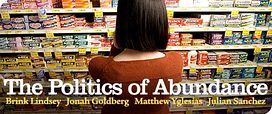I think Jonah is on to something in his last post, but his use of of wacky leftist Hollywood millionaires to make his point, even if an admitted caricature, is probably a red herring. I wrote a review about a year back of an excellent book called Promises I Can Keep: Why Poor Women Put Motherhood Before Marriage. And while the argument deserves to be read in full, here’s one key part of the account sociologists Kathryn Edin and Maria Kefalas promise in their subtitle: The sorts of economic changes Lindsey talks about have produced a broad middle-class trend toward delayed childbearing. Where once marriage was a central rite of passage into adulthood, it’s now utterly unremarkable to find men and women alike who postpone any serious consideration of marriage until their late 20s or early 30s, when they’ve finished college, and perhaps some post-graduate education, and become established in careers. Even most conservatives aren’t prepared to say there’s anything wrong with this as such. But where middle-class couples are delaying both marriage and childbearing, their poorer counterparts, lacking realistic opportunities to build satisfying identities around ambitious careers, are far less willing to forego the meaning and validation parenthood provides, and correspondingly less likely to view early pregnancy as a life-derailing catastrophe to be avoided at any cost. The problem, in other words, is not “Hollywood values,” or even “middle-class values,” but the unstable combination of two independently viable value sets—what the late social theorist Jane Jacobs might have termed a “monstrous moral hybrid.” Relative to the broad shift in expectations about marital timing, the effect of a tiny handful of affluent women voluntarily choosing single motherhood is negligible, and the focus on it distracting.
This account is actually fairly congenial to Lindsey’s thesis, since it both identifies economic development as a source of this particular culture war and holds out the hope that still more broadly shared affluence may complete the shift from the unstable, transitional value set to the modern middle-class one. Or, to put it in the form of a Simpsons paraphrase for Jonah’s sake: Here’s to mass affluence—the cause of, and solution to, all life’s problems.

